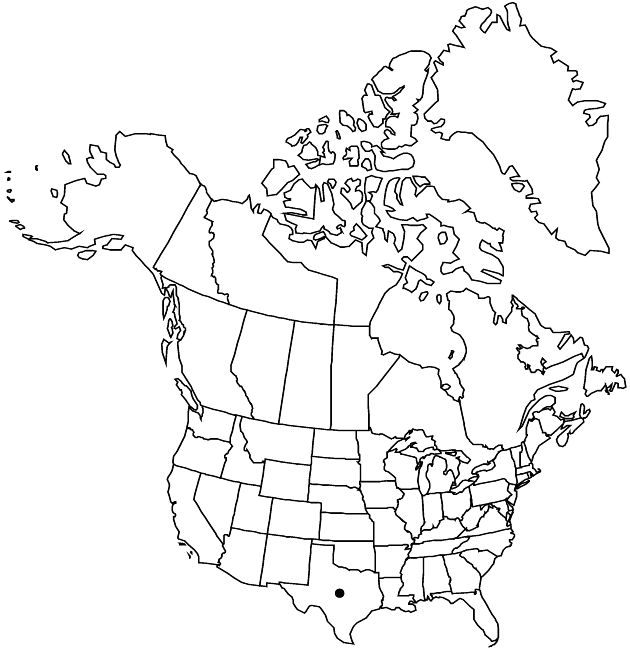Difference between revisions of "Pseudognaphalium austrotexanum"
Sida 19: 507, fig. 1. 2001.
FNA>Volume Importer |
imported>Volume Importer |
||
| (6 intermediate revisions by 2 users not shown) | |||
| Line 24: | Line 24: | ||
|elevation=0–10[–600] m | |elevation=0–10[–600] m | ||
|distribution=Tex.;Mexico (Nuevo León). | |distribution=Tex.;Mexico (Nuevo León). | ||
| − | |discussion=<p>Pseudognaphalium austrotexanum is similar to P. viscosum in general appearance: taprooted annuals with stems white-tomentose, strictly erect, and mostly unbranched proximal to heads, leaves linear to linear-lanceolate, strongly bicolor (green and glandular adaxially, white-tomentose abaxially), loosely to strictly ascending, crowded on relatively short internodes and continuing to immediately proximal to the heads, and basally subclasping but not strongly auriculate, phyllaries silvery white, thin, and hyaline, and cypselae minutely papillate-roughened.</p> | + | |discussion=<p><i>Pseudognaphalium austrotexanum</i> is similar to <i>P. viscosum</i> in general appearance: taprooted annuals with stems white-tomentose, strictly erect, and mostly unbranched proximal to heads, leaves linear to linear-lanceolate, strongly bicolor (green and glandular adaxially, white-tomentose abaxially), loosely to strictly ascending, crowded on relatively short internodes and continuing to immediately proximal to the heads, and basally subclasping but not strongly auriculate, phyllaries silvery white, thin, and hyaline, and cypselae minutely papillate-roughened.</p> |
|tables= | |tables= | ||
|references= | |references= | ||
| Line 33: | Line 33: | ||
-->{{#Taxon: | -->{{#Taxon: | ||
name=Pseudognaphalium austrotexanum | name=Pseudognaphalium austrotexanum | ||
| − | |||
|authority=G. L. Nesom | |authority=G. L. Nesom | ||
|rank=species | |rank=species | ||
| Line 48: | Line 47: | ||
|publication year=2001 | |publication year=2001 | ||
|special status= | |special status= | ||
| − | |source xml=https:// | + | |source xml=https://bitbucket.org/aafc-mbb/fna-data-curation/src/2e0870ddd59836b60bcf96646a41e87ea5a5943a/coarse_grained_fna_xml/V19-20-21/V19_693.xml |
|tribe=Asteraceae tribe Gnaphalieae | |tribe=Asteraceae tribe Gnaphalieae | ||
|genus=Pseudognaphalium | |genus=Pseudognaphalium | ||
Latest revision as of 19:54, 5 November 2020
Annuals, 30–70 cm; taprooted. Stems densely and closely white-tomentose-floccose, glabrescent, not glandular. Leaf blades (crowded, internodes mostly 1–3, sometimes to 10 mm) linear to linear-lanceolate, 2–5 cm × 1–3 mm, bases subclasping, not decurrent, margins strongly revolute, sometimes closely sinuate, faces bicolor, abaxial densely and closely white-tomentose, adaxial green, densely stipitate-glandular, otherwise glabrate. Heads in corymbiform arrays. Involucres broadly campanulate, 4.5–5 mm. Phyllaries in 5–7 series, silvery white (hyaline, shiny), narrowly ovate to oblong or elliptic (apices of inner thickened and slightly raised along midribs, apiculate), glabrous. Pistillate florets [46–]76–102. Bisexual florets (6–)8–11. Cypselae ridged, papillate-roughened.
Phenology: Flowering Oct–Dec(–Jan).
Habitat: Sandy soil in pastures, grasslands, open disturbed sites
Elevation: 0–10[–600] m
Distribution

Tex., Mexico (Nuevo León).
Discussion
Pseudognaphalium austrotexanum is similar to P. viscosum in general appearance: taprooted annuals with stems white-tomentose, strictly erect, and mostly unbranched proximal to heads, leaves linear to linear-lanceolate, strongly bicolor (green and glandular adaxially, white-tomentose abaxially), loosely to strictly ascending, crowded on relatively short internodes and continuing to immediately proximal to the heads, and basally subclasping but not strongly auriculate, phyllaries silvery white, thin, and hyaline, and cypselae minutely papillate-roughened.
Selected References
None.